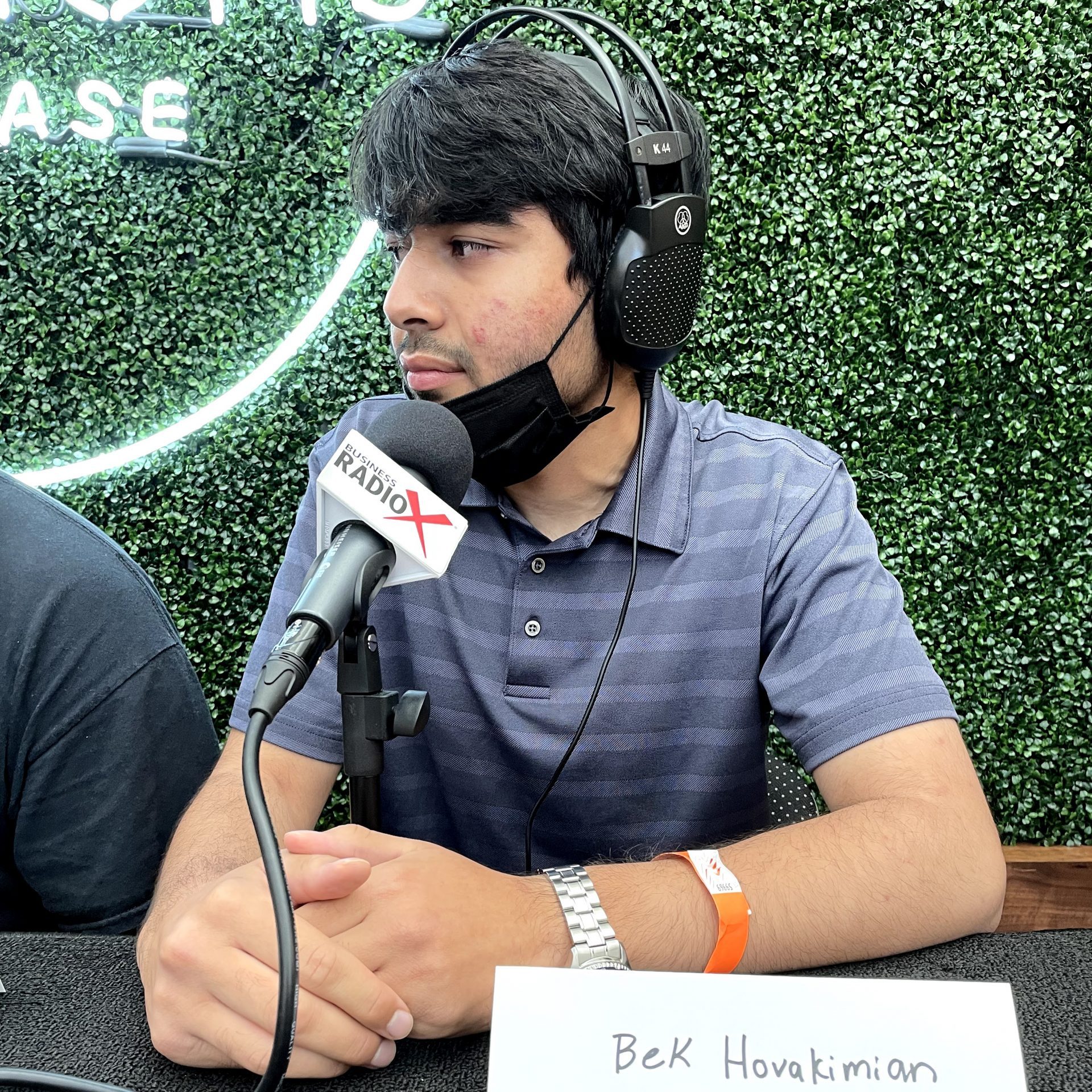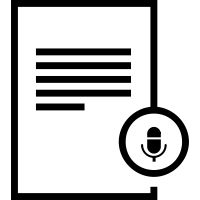


 This transcript is machine transcribed by Sonix
This transcript is machine transcribed by Sonix
TRANSCRIPT
Intro: [00:00:07] Broadcasting live from the beautiful legacy theater in Alpharetta, Georgia, for code launch Atlanta, 2021. It’s time for Atlanta Business Radio. Now here’s your host.
Stone Payton: [00:00:23] Welcome the code launch Atlanta twenty twenty one broadcasting live here from the beautiful legacy theater at this phase, is that what this place is called?
Lee Kantor: [00:00:33] Phase events,
Stone Payton: [00:00:34] Phase events out here now Faretta. We’ve already made some new friends, caught up with some old ones. Folks are starting to file into the theater. We don’t want to keep these two young gentlemen too long, but we just had to visit with them. Please join me in welcoming to the broadcast with eight oh eight Wave Pobby and back. How are you
Abhinav Goyal: [00:00:55] Doing? Well, thank you so much for having us today. We really appreciate it. Well, we’re
Lee Kantor: [00:00:58] Excited to learn what you’re about to tell us about either way, way of how you serve in folks.
Abhinav Goyal: [00:01:03] Yeah. So A2A Wave is a platform where musicians can basically find recording studios in their area and book our request studio time. So initially we saw that the problem was musicians. They weren’t really able to find the right studio where they can make their music and make their music career. So this is why we created the app, basically.
Lee Kantor: [00:01:21] So you’re here by Georgia Tech students right now?
Abhinav Goyal: [00:01:25] Yes, we’re both fourth year undergraduate students. See us students.
Speaker3: [00:01:28] So how did you guys connect together? Were you friends? Like, what are you both musicians like? Did you have this problem? Like what’s the genesis of the idea?
Abhinav Goyal: [00:01:38] So originally from Boston, before the second Marosi from Chicago. And fortunately, we were able to connect through. We lived in the same dorm freshman year, so we were able to connect that way. And we just clicked on the spot and we just went through like six, seven different ideas freshman year. And we just at the end of the year was finalize this idea, like, OK, this is the one we’re going to work on. It’s like the next, you know, the rest of our life, basically. So.
Lee Kantor: [00:02:01] So where are you musicians? Are you just now that musicians would have this challenge?
Abhinav Goyal: [00:02:05] Yeah. So we decide that musicians have this problem. We were of like, what are some big problems? And we just saw that this was an issue. But yeah, we’re we’re not like producers are artists like ourselves. But, you know, I played a couple of instruments.
Bek Hovakimian: [00:02:19] Yep. And Obie was an executive producer for a on the track, and I worked at the radio station Hirotec.
Lee Kantor: [00:02:27] And. OK, so you’re a little familiar with kind of the music industry and you knew that this this could be a problem. People told you, hey, it’s hard to find studio time or I can’t get the right studio for what I need. So people were voicing that challenge to you? Yes, definitely. And then OK, so now you have this concept. What were the first steps to kind of validate this?
Abhinav Goyal: [00:02:48] So the first step was to come up with like different hypotheses. And so really go in the community and talk to customers and see like if they actually have this problem. And, you know, we validated all our hypotheses and they’re like, OK, yeah, I have, you know, where they were coming to us to see, OK, what what studios can I book? You know, what are the right engineers for me to work with? And, you know, at one point it became so much like, OK, we have to build an app to where they can do this themselves and they can, you know, see everything about that studio and then look at themselves as well.
Stone Payton: [00:03:15] Do do you hear the wisdom and what’s this guy saying? And I know people who are 55, 60 years old, who skip this whole step of customer discovery, idea validation, getting some real data from the marketplace. And here are these two young men. That was your that’s the first thing you decided to do. Did you get some direction to do that or did that just come to you instinctively?
Abhinav Goyal: [00:03:38] Oh, we definitely got some direction. So, yeah, being a it’s like there’s a great startup culture at Georgia Tech that they’ve been developing for so many years. If you heard of of the credit X program, Edgeware, it’s actually went through like Startup Lab. I did a prototype. And then the final stage, like that’s the first summer that we did this company. We actually got to step into the accelerator, Scottrade, that created Exide. So a lot of the coaches, a lot of the mentors, the Jerzyk, they really helped us really get that initial customer discovery phase off the ground, which has really helped us with the foundation of our business.
Lee Kantor: [00:04:09] Now, in any of these marketplace apps, it’s a chicken and egg. You need to have all of the studios in there and you have to have the users in there. How did you go about kind of building out the marketplace?
Bek Hovakimian: [00:04:21] That’s a great question. So right now, we’re about twenty five studios and about a thousand customers in and in the past, we’ve held studio sessions at Patchwork and we’ve done events in several different studios. So that was our initial core base building our brand, and now we’re ready to launch it publicly.
Lee Kantor: [00:04:38] So now how does the monetization, who pays or do you get a piece of any transaction that occurs? Like what’s the monetization?
Bek Hovakimian: [00:04:49] So right now, the way it works is we have a free model and a premium model on the studio side. So for example, you premium features in the studio, how many rooms you can list. And that ranges from fifty to two hundred dollars a month.
Lee Kantor: [00:05:02] And so that’s how you plan to monetize this through the studios.
Abhinav Goyal: [00:05:06] Yes, with a subscription process as well.
Lee Kantor: [00:05:08] So it’s a place for them to promote the studio so they can sell unused time.
Abhinav Goyal: [00:05:13] Yes. So we’ll have advanced booking management software that they can use to find and manage their clients as well.
Lee Kantor: [00:05:19] And so then the client can book the time and pay right there on the app.
Abhinav Goyal: [00:05:24] Yes. So like some studios, they prefer to prescreen so that they’ll be able to funnel in requests and then they’ll be like, OK, we want this Kliner, we don’t want this client. And then the client can essentially pay for the booking. Right.
Lee Kantor: [00:05:35] So what do you need more of right now?
Abhinav Goyal: [00:05:38] Oh, we don’t believe there’s any obstacles stopping us from going. So like our next steps. Right now, we’re looking to build an advisory team. That’s our next step. And then just building on some more features, more features that address the problems that the studios have. And then at that point is just about marketing and sales.
Lee Kantor: [00:05:53] So now how did you kind of arrive at the price point for the studios?
Bek Hovakimian: [00:05:58] That’s something we’re still working on, but we’ve seen what really provides value and we’re really trying to mimic what’s really going to get the best out of a studio and what they need,
Lee Kantor: [00:06:06] Because once the person box at the studio, that’s that person could be a client for a long time.
Bek Hovakimian: [00:06:12] Exactly. A lifetime customer.
Lee Kantor: [00:06:14] So do you have an idea of what that values or to a studio?
Bek Hovakimian: [00:06:19] We just had a customer book at AEOI Digital, and he was a happy returning customer. And let’s just say an average booking can be anywhere between two hundred to a thousand dollars. And you can book maybe five, 20 times a year.
Lee Kantor: [00:06:32] Right. So that starts adding up. And if you’re in a place where that started. I hope you’re getting a piece of that action.
Bek Hovakimian: [00:06:39] Absolutely.
Lee Kantor: [00:06:41] So what are you looking for funding right now or this thing? You’re kind of bootstrapping this until you get a few more clients.
Abhinav Goyal: [00:06:48] So currently we’re looking to before we go. So like an actual seed or presedo or a series around. We’re looking to build a advisory team of up to five advisors and then utilizing that leverage that we have to get possibly a higher valuation or more money when we do appreciate our seed round.
Lee Kantor: [00:07:04] Now, are you finding that that’s the case or are you hearing that in the startup ecosystem? Because there was a time where the people were trying to get funding almost immediately, and now it seems like people are trying to bootstrap and kind of get as much runway as possible before they start taking funding so they don’t dilute as much. Are you finding that to be the case?
Abhinav Goyal: [00:07:23] I think ownership has become a really big thing the last last couple of years with Saab’s and the startup founders. And I think that they want to have as much leverage as possible before and have as much product market fit as well before actually going getting that funding. Right.
Lee Kantor: [00:07:37] So then it’s kind of more on the startup to start selling some stuff. Yes. Now, how good is Georgia Tech and teaching you how to sell?
Bek Hovakimian: [00:07:48] It’s great we have a great team of different advisers and staff at Georgia Tech who really nail down the process of customer discovery. One of the biggest things we’re working on is really trying to get that product market fit, really validate if it’s a real problem and solve their needs.
Lee Kantor: [00:08:03] And then how many studios are there, I guess, in the world. Right. This things to the world. It’s not just for Atlanta or America.
Abhinav Goyal: [00:08:11] So according to like U.S. Census, there’s roughly 7500 or two thousand CDOs recording studios in America. And then in the in the world, we estimate to be about ten thousand. But that doesn’t really include like home studios, which is another aspect to it as well.
Lee Kantor: [00:08:26] Good stuff. Well, congratulations on all the success. If somebody wants to check out the site or app, what’s the best coordinates to do that?
Bek Hovakimian: [00:08:34] You can find us on Instagram at at the A2A wave. And the website is eight 08, the bio.
Lee Kantor: [00:08:41] Good stuff.
Stone Payton: [00:08:42] All right. Thank you so much. We’ll be back in a few from code launch Atlanta. Twenty twenty one.














